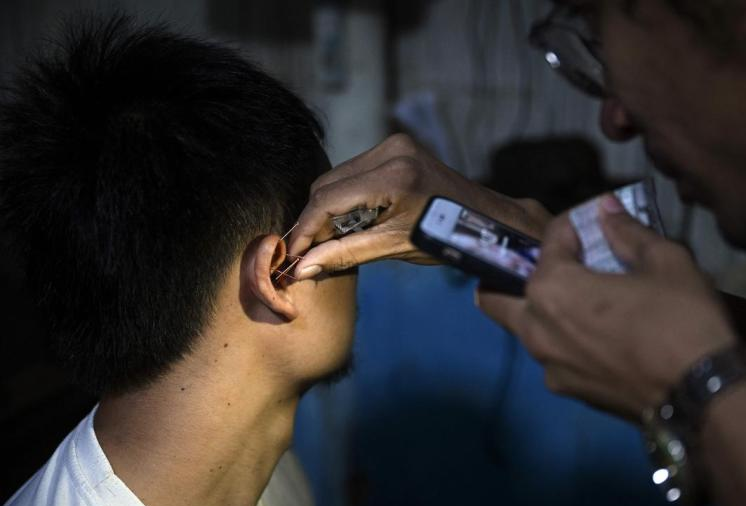
In a wooden house deep in the Thai jungle, young refugees from Myanmar wait patiently for acupuncture to cure their drug addiction.
More than three years of violence in Myanmar, combined with the relative availability of drugs locally, have created a "perfect storm" of rapid drug proliferation. Many have fled their homes, seen loved ones killed and have nowhere else to go in refugee camps, often turning to drugs to soothe their trauma.
Marip, a counselor at a camp in a remote forest in Thailand's Tat province, said: "The youth in the camp feel hopeless... They don't know what to do. With no job security and no future, they end up taking drugs. Inside the camps, they have easy access to drugs."
Myanmar national Marip was also addicted to drugs, and now successfully clean up, choosing to help fellow citizens in Thailand's drug rehabilitation center.
The Drug and Alcohol Recovery and Education Program is funded by the United Nations and other aid agencies. They use acupuncture to help drug addicts detox, massage, yoga and other methods to help drug addicts reduce their desire for drugs and control the intense pain of withdrawal.
The group runs drug rehabilitation programs in five refugee camps and more than 40 villages in Myanmar's Karen State, and says its 90-day treatment has a 60 percent success rate.
The "Golden Triangle" region where Myanmar, Thailand and Laos meet has long been a hub for the drug trade. The United Nations Office on Drugs and Crime (UNODC) said in a report this year that methamphetamine production in the Golden Triangle has soared, causing wholesale prices to plummet.
On the streets of Myanmar and in refugee camps, drug addicts can buy "Yaba" high pills for pennies.
"These drugs are now very cheap and people can easily buy them," said David Hoffman, UNODC deputy regional representative for Southeast Asia and the Pacific. In most parts of the Mekong, a wild horse is cheaper than a bottle of beer."
Refugee camps along the Myanmar border are mostly controlled by local ethnic armed groups, most of which finance their operations through drug production and trafficking.
A senior Myanmar police narcotics officer has revealed that many new drug routes have emerged across the country as a result of the fighting. "We face many difficulties in combating the drug trade. This is a serious problem because there are many armed groups involved."
Marip says the drug epidemic ultimately pays the biggest price for those who are already displaced by the fighting. "No matter what, getting rid of drugs is priceless."

Driven by the Trump administration's push to relax financial regulations and the recovery of investment banking business, the market value of the six major banks in the United States has cumulatively increased by approximately 600 billion US dollars by 2025.
Driven by the Trump administration's push to relax financia…
On Christmas evening, U.S. President Trump posted on social…
According to multiple foreign media reports, the recent fin…
The middle class, once regarded as the cornerstone of Ameri…
On December 19th local time, the US military launched a lar…
The Boxing Day sunshine should have cast a false glow of pr…